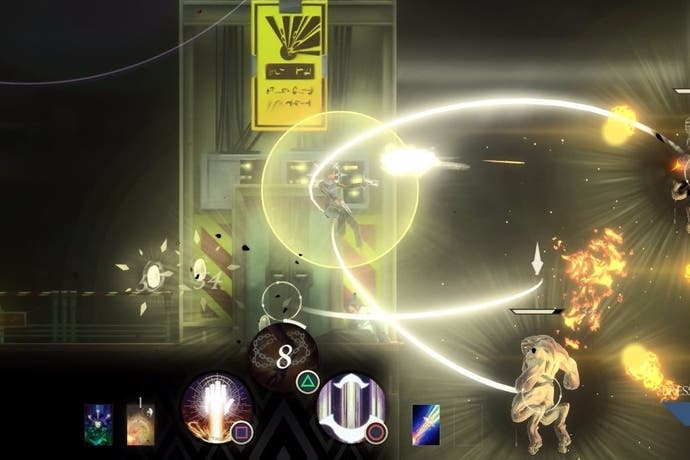Seraph: The shooter that (mostly) ditches aiming
Strange angels.
An hour or two with Seraph today has made me want to dig out the GameCube - not that I ever need too much of an armtwist on that front in the first place. Seraph's a 2D shooter with several forward-thinking ideas, and it reminds me of P.N.03 which is still, inexplicably, trapped inside that glorious purple box that Nintendo built with no apparent means of escape.
Seraph and P.N.03 have some crucial things in common. They're both games in which auto-aim and acrobatic movement converge at the heart of a design that places the emphasis on evasion as much as damage-dealing. Both are games, in other words, that take charge of where your attacks are headed because you have much better things to be doing with your time. That's always exciting. (Worth noting: you can control target prioritisation if you really want to.)
In Seraph's case, the much better things involve zipping around the game's moody procedurally-generated levels while you try to stay one step ahead of the baddies spawning all about you. Seraph casts you as an angel, I gather - albeit a strange sort of angel who needs twin pistols to do her holy bidding and has to take the elevator when she wants to work her way back to heaven. Her enemies are all demons - animalistic, deathly pale things with talons and tails and other nasty appendages. They're fast-moving and many of them can teleport, so Seraph's key ability may not be those twin pistols that can lock onto two foes at once, but rather Blink, a dash move that can be triggered in any direction, giving her a bit of space to add to the standard arsenal of double- and wall-jumps.
It's wonderfully frantic stuff as you zip around levels that thread you through corridors one moment and drop you into open arenas the next. There are special attacks that you can collect and swap in and out as you play, and there's a dizzying potential for crafting alongside the standard leveling system that gives you a new perk every now and then. All of this forms a nice muddle of warm potential for the first few hours of the game, but most of Seraph's fun, I'm glad to say, exists firmly in the present, as you dodge, backflip and double-blast while protecting a health bar that seems massive, but has a habit of disappearing in huge gulps.
Seraph's the work of Dreadbit Games, a tiny indie based in Guildford, whose previous outing, Ironcast, bolted steampunk mech warfare and match-three puzzling together to wonderful effect. You can see the same kind of precise, intricate artwork in both games, and also the same love of systems that enrich proceedings, be it upgrades that offer tricky choices, to special attack load-outs that properly change the way you approach things. There's also, I think, a deep love of risk and reward. In Ironcast this often came down to where to spend your effort - backing up your own shields or going for the kill. In Seraph, a game about shooting monsters from a carefully-won distance, it's seen most clearly in the Smite attacks - close-up angelic melee finishers, which are the only way to truly get rid of some of the bigger nasties who are out to get you.
There's more, inevitably: adaptive difficulty, clever Twitch integration and a brilliant daily challenge, but Seraph's core is so enjoyable that this currently feels like extra tinkering from a developer that clearly loves to lose themselves in the nuts and bolts of design. P.N.03 may be stuck on the GameCube, then, but between this and Hyper Light Drifter, its peculiar ethos is alive and well in 2016.


